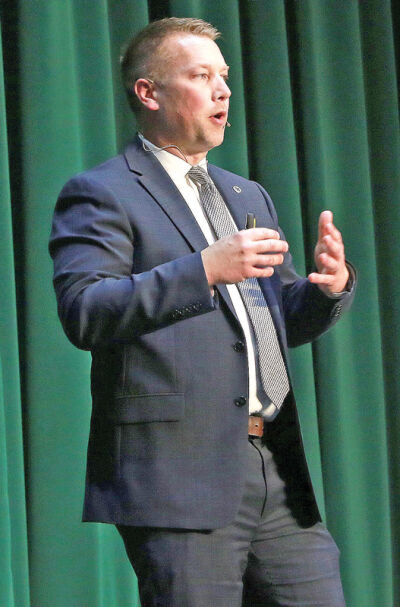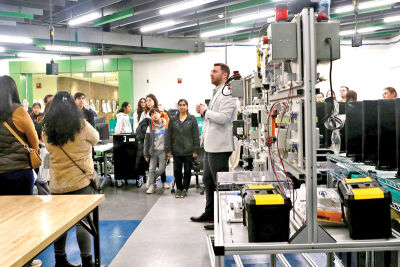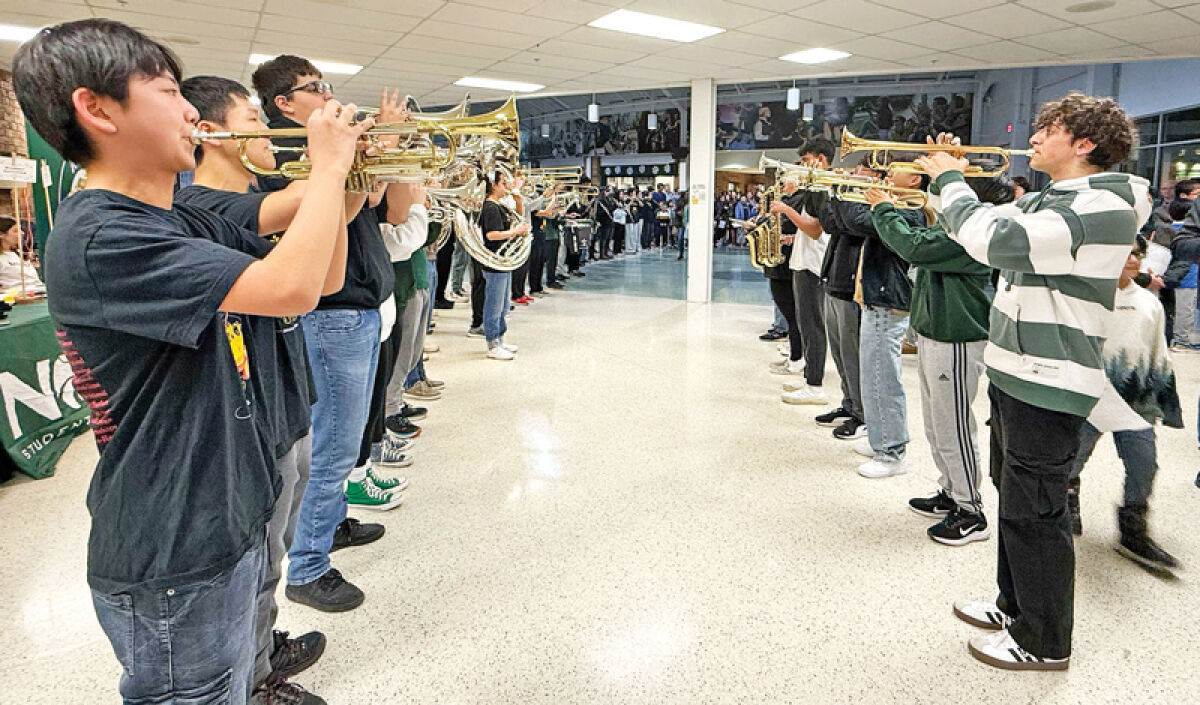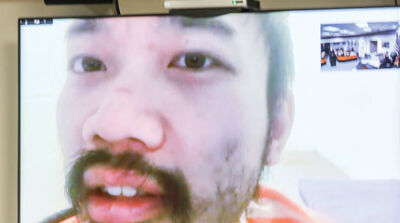
Ben Mainka, superintendent of the Novi Community School District, gives his third annual State of the District address.
Photo by Erin Sanchez

Stewart Reich, project manager for King Scott Associates, gives members of the community a tour of the high school and rooms they would like to upgrade, including the robotics room.
Photo by Erin Sanchez
NOVI — During the annual State of the District address Feb. 25, Novi Community School District Superintendent Ben Mainka spoke of the district’s aspirations and the possibilities attached to the potential approval of a no-tax-increase millage later this year.
Aspirational plan
Mainka said that the district started to create an aspirational plan last year. According to Mainka, the district was looking to figure out where it was headed as a school community and figure out what investments it desired and what things it wanted to go after.
“I think that every successful organization has to have that true north, that strategic vision of where you’re headed,” Mainka said.
The district’s plan is focused on five core focus areas: “innovative academics,” “staff support,” “wellness,” “student passions and interests,” and “financial and infrastructure management.”
The district has been actively working on a variety of initiatives within each category.
Graduate profile
Mainka explained that the plan was based on the idea of the district’s graduate profile. The profile consists of competencies that the community, staff and the Board of Education feel students should have when they leave Novi High School. The ideal graduate is an effective communicator, purpose seeker, an empathetic collaborator, a critical thinker and resilient at problem-solving.
“What we know is that these are actually the skills that our employers in the future workforce or even in the current workforce are looking for,” Mainka said.
He said that students’ education should not only be geared toward a high level of understanding in core subjects such as reading, math, science and history, but to be able to understand those core subjects with the competencies stated in the graduate profile.
“What we understand is that it’s not as important any longer, especially with the advent of AI, knowledge acquisition is less important than these competencies and skills,” Mainka said. “We call these durable skills, and these durable skills are what’s going to help human beings be successful in whatever they endeavor to do.”
Academics
The district has been making strides in the area of innovative academics to eliminate the problem of inconsistencies in grading methods across not only classrooms, but schools as well.
“This is not a Novi problem. This is a problem that exists in pretty much every school system in America,” Mainka said.
He said the school is working to implement a standardized, referenced grading system that is based on research and is consistent throughout the district.
Mainka said the district is also focusing on literacy in the elementary schools, as well as multi-tiered layers of support.
Staff support
The district is focusing on its staff as well. According to Mainka, in terms of schools, the No. 1 investment is staff. He said staff are with the children every day and need to feel that the district is the best place to work, that they have a say in decisions that impact them, and that they have opportunities to grow.
Mainka said that the district had 70 teachers last year work on the new literacy program that was implemented this year, and that those teachers provided the administration with guidance on the decisions that were made regarding the program.
Mainka said the district is looking at ways to retain staff. He said the district is proud that for the first time in over a decade, the district did not have a resignation at the elementary school level this year.
Wellness
The district is looking at maintaining wellness for not only students, but staff as well. The district is having students take surveys on their experiences in school and will soon have the staff and parents do the same.
“Sometimes the information we get from it is inconvenient. It might not be the information we want, but it is the information we want, because that’s how we grow and get better,” Mainka said.
School safety is a high priority for the district as well as the community. In order to help maintain the safety of its staff and students, the district has implemented a vast variety of safety equipment and protocols.
“We have invested in technology that is in our camera systems, our software, our cardreaders, as well as our hard, durable security,”said Mainka.
He said the district has also invested a lot in mental health, understanding why students might be feeling a certain way and providing adequate resources.
The district will soon be converting the current educational services building into a wellness center. The center will cover all dimensions of health including physical, mental, financial and emotional.
Student passions and interests
Mainka said the district is striving to help students find the answers to two fundamental questions: What am I uniquely good at, and what am I passionate about?
“If we can help students understand that — that personalization is very powerful and schools historically have not done that well,” said Mainka.
In an effort to help achieve that personalization, the district has expanded its elementary clubs and activities. There are now a vast variety of clubs and extracurricular opportunities at all the district’s elementary schools that will feed into the extracurricular programming at Novi Meadows, which teaches the fifth and sixth grades, and Novi Middle School.
The district has implemented a positivity project which focuses on the 24 karat strengths of positive psychology and gives the framework for children to understand more about who they are as a person and how to develop those character strengths, Mainka said.
“It’s really a strengths-based approach, helping them manage their emotions and understand how to interact in social situations properly,” said Mainka.
Financial and infrastructural management
Mainka said the district is “very” financially stable. He said it has a stable fund balance and for the first time in a long time received a clean audit last year. This means that the district had no findings on any audit materials, carried over a healthy fund balance year after year, and was able to do a number of capital improvements. According to Mainka, all district buildings are up to par.
Mainka announced that the old sixth grade house behind Novi Meadows will be reopened this summer as the home for the district’s special education center, adult transition center, the Japanese School of Detroit, and the Novi Robotics Center.
Millage
The Novi Community School District Board of Education voted Jan. 23 to pursue a no-tax-increase millage, “to continue to improve the excellence that we have.” Although many of the details have yet to be decided upon, the district will have the language finalized in time to be placed on the November ballot.
The Board of Education has asked for the millage to be renewed every five to six years, according to Mainka.
“You might be asking the question, ‘Novi’s facilities are pretty great. What do you really need to do?’ And the answer is, when you’re the best, the way that you stay there is to continue to fight the fight of innovation and to continue to fight the fight of being the best and leading,” Mainka said. “We want to stay in a spot where we’re leading and not just waiting to fall behind, and that’s a constant struggle that we have.”
Mike Posthumus, of Fielding International, a former educator, said that the company he was representing at the State of the District is a team of educators and designers and architects. They are providing the district with architectural and engineering services. He gave more insight on what might be done if the district passes the millage in November.
“We can bring some insights and expertise from seeing what the most innovative and exciting schools in the entire world are doing and how we can bring that to this community,” Posthumus said.
He said that with the world of AI and other technology becoming more popular, one of the things that will be important in the future is focusing on how communities come together to do work “human to human.” He said spaces such as dining and common areas where people can come together are very important.
He said they are looking at many of the core ideas that the district has as well, such as wellness, and plan to incorporate spaces that help students connect, feature natural lighting and are where people can “really, truly feel that they belong.”
“What we really want to do is imagine a learning environment, a set of facilities and experiences that bring the places that you go to school in alignment with that vision,” Posthumus said.
He said that from extensive research and feedback from the community and staff, they have developed six guiding principles that are driving the project: the idea of joy and purpose, promoting holistic well-being, flexible student centers that are dynamic, opportunities and spaces to create more community connection, safety and security and accessibility and functionality, and the idea of spaces that inspire and allow people to innovate and create.
“This community who has been so supportive of us for so many years, for so many past bonds will have another opportunity in November of 2025 to go back out and to support the innovation and to continue to support us as leaders in this state and throughout the country with what’s possible in 2025,” Mainka said.
 Publication select ▼
Publication select ▼


























